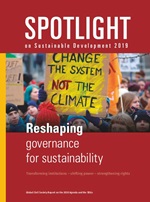Social Watch E-Newsletter - Issue 351 - September 10, 2019
Published on Tue, 2019-09-10 15:05
 |
| Issue 351 - September 10, 2019 |
|
|
| |
|
| |
UN: Five summits in five days
|
| |
|
| |
 |
Over a hundred Heads of State or Government are expected to arrive to New York in the last week of September for a series of back-to-back summit meetings at the opening of the General Assembly of the United Nations: the Climate Action Summit and the High-level Meeting on Universal Health Coverage on 23 September, the Sustainable Development Goals (SDG) Summit on 24-25 September, the High-level Dialogue on Financing for Development (FfD) on 26 September, and a High-level Review of policies on small islands states on 27 September.
These multiple events enable world leaders to confront policy gaps, address interlinkages among these issues and design policies and actions in an interconnected way. Similar vested interests that resist regulation of the corporate sector to protect the largest greenhouse gas emitters also block increased access to affordable medicines and vaccinations. Further, the conversations on financing the SDGs, particularly on ecological and climate issues cannot be divorced from the programme on Small Island Developing States (SIDS). Read more
|
| |
|
| |
|
| |
Arab Watch Report on the Right to Food
|
| |
|
| |
The right to food is a priority at the global level, and especially in the Arab region where countries with heightened armed conflicts as Syria, Yemen, Iraq and Palestine suffer from severe malnutrition. And yet, conflicts are not the only reason behind the deterioration in the food situation, affected by social and economic policies, climate change and unsustainable production and consumption patterns. The Arab Watch Report 2019 raises these concerns through 10 national and six regional papers, with an all-encompassing approach to the right to food. Read more
|
| |
|
| |
|
| |
Global governance: if it doesn’t challenge power it isn’t democratic
|
| |
|
| |
In the 2030 Agenda for Sustainable Development, UN Member States commited to “reach the furthest behind first”. Can this commitment be applied to governance and related policies, budgets and institutions?
Barbara Adams explores the implications for global governance of the promises of the 2030 Agenda, the practice of the High-level Political Forum (HLPF) and the many and sometimes contradictory approaches and initiatives of the UN system and its ‘governors’.
This analysis highlights the need to move from the current pay-to-play orientation to one of democratic accountability for ‘people and planet’ and recommends a strengthened and re-positioned HLPF and UN General Assembly to drive momentum for the UN as the leader of rights-based multilateralism. Read more
|
| |
|
| |
|
| |
Human Rights in the 2030 Agenda
|
| |
|
| |
 |
Human rights are explicitly inscribed in the purpose, vision and normative foundations of the 2030 Agenda for Sustainable Development and the Sustainable Development Goals (SDGs). This grounding of Agenda 2030 in human rights standards – a hard-won civil society victory – represents an enormously significant evolution in the historically uneasy relationship between human rights and development in the global governance arena.
If human rights are to help the SDGs “transform our world”, three fundamental steps are needed to disrupt the selectivity and hypocrisy still surrounding the issue in the sphere of global development governance. First, human rights must be articulated and understood holistically, encompassing their economic, social and environmental dimensions, and recognizing their relevance to the entirety of the 2030 Agenda, not just Goal 16 on peaceful and just societies. Second, spaces must be not only defended but expanded for those most affected by development injustice to hold those responsible to answer for their actions and omissions through the broader ecosystem of accountability that human rights opens up. Third, governments must adopt a radically different approach to international cooperation and global partnership founded on the recognition of their common but differentiated responsibilities to respect, protect and fulfil human rights within and beyond their borders. Read more
|
| |
|
|
|
| |
|
SOCIAL WATCH IS AN INTERNATIONAL NGO WATCHDOG NETWORK MONITORING POVERTY ERADICATION AND GENDER EQUALITY Social Watch >>
Social Watch E-Newsletter For comments, sugestions, collaborations contact us at: socwatch@socialwatch.orgTo stop receiving this newsletter send a message with the subject "unsubscribe" to: socwatch@socialwatch.org |
|
|
|
SUSCRIBE TO OUR NEWSLETTER
Submit
|
